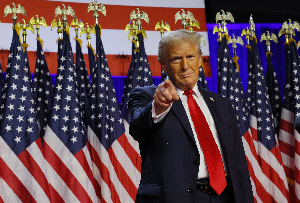I am an Afro-optimist who believes that we could leverage emerging technologies to leapfrog into the future.
I also believe that Africa will see its enormous population and resources as a competitive advantage and move the continent out of the throws of poverty.
My optimism was, however, dampened last week at the immigration office in Abidjan, Ivory Coast.
At the invitation of the African Development Bank (ADB), I agreed to travel to Abidjan to make a presentation on emerging digital technologies in land management at the Land Policy Conference.
Prior to travelling, I tried to get an online visa that I have used in my previous visits to Ivory Coast mostly for ADB functions. The portal was down but ADB was swift at organising for an entry visas.
On arrival, the immigration official confiscated my passport and ordered me into a police office. I obeyed. Inside the police office, I enquired why I had been sent there.
"No English please," a female police officer responded. "Need help? Speak French," she added.
"No French," I responded.
We stared at each other for an hour before other delegates from other African countries streamed into the police station. An official from ADB finally came to rescue the delegates.
Even with his intervention, the airport officials, including the police had to go through seven other steps.
Not ready
From the welcome we received I concluded that Africa was not ready for the African Continental Free Trade Area (AfCFTA). Free trade is not possible without free movement of people.
The problem is larger than these small visa altercations. As I spoke to other detainees, we couldn't lay a finger on where the problem was.
Some said that we needed to sustainably deal with the language problem in Africa. I didn't think language is the problem. If it was language, then what should be the African language?
In retrospect, the policewoman and I were within our colonial confines in an African country.
There is no quick fix to the language challenge. There are other fundamental differences that Africa needs to deal with at continental level as well as other problems at national level.
Many African countries have never quite dealt with the effects of colonial conditioning, which has a bearing on the pace of economic transformation. Fragmentation of the continent was meant to benefit invaders, not Africans.
Language, therefore, is a secondary issue. After all, the European Union functions with many languages. Although it may not be easy, the African Union (AU) must push for multilingualism, just like the European Union (EU), at all points of interaction.
The Chinese contractors have managed to learn all the dominant European languages in Africa and they are able to trade without any problems.
Economic historian, Nonso Obikili, says fragmentation of Africa started in 1500 when millions of Africans were shipped to America as slaves. It also impacted on villages and towns where the intensity of slave trade was high.
During the colonial period, fragmentation of Africa was intensified. It was noted by Katalin Buzasi in her research paper, Does colonialism have an impact on the current language situation in Sub-Saharan Africa? that "colonization and ethnolinguistic fragmentation have relevant long-lasting impacts on ex-colonies and might explain development and underdevelopment of different parts of the world".
In recent times, French President Emmanuel Macron, who made disparaging remarks about Africa at the end of the 2017 G20 summit in Germany, managed to fragment the West Africa further.
In spite of the fact that the West African countries have the Economic Community of West African States (ECOWAS), he proceeded to create a new organisation called G5 Sahel summit, bringing together Burkina Faso, Mali, Mauritania, Niger and Chad.
Bring friction
The new organisation does not cover the entire francophone countries, and is bound to bring friction in the West Africa region and help advance the divide and rule agenda of neo-colonists.
In spite of all the pressure to keep Africa fragmented, there is a flicker of hope as noted from other researches showing that there is potential for international trade to drive economic growth.
A World Bank study says we need to do more if the continent is to realise the potential in cross-border trade. These include:
Facilitating cross-border trade, especially by small, poor traders, many of whom are women, by simplifying border procedures, limiting the number of agencies at the border and increasing the professionalism of officials, supporting traders associations, improving the flow of information on market opportunities, and assisting in the spread of new technologies such as cross-border mobile banking that improve access to finance.
Removing a range of non-tariff barriers to trade, such as restrictive rules of origin, import and export bans, and onerous and costly import and export licensing procedures.
Reforming regulations and immigration procedures that limit the substantial potential for cross-border trade and investment in services.
The AU has a task to sensitise African policy makers on the need for unity and to discourage strategies meant to fragment the continent any further in the name of promoting regional trade.
There are just too many non-tariff barriers that continue to hold back Africa from exploiting potential.
Restricting movement of people is counterproductive to building a vibrant cross-border trade for economic growth. African countries should emulate Rwanda and Kenya that do not have restrictive border controls for Africans.
The writer is a professor of entrepreneurship at University of Nairobi's School of Business.
Opinions of Monday, 2 December 2019
Columnist: Bitange Ndemo



















